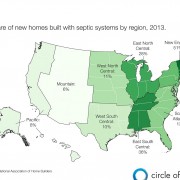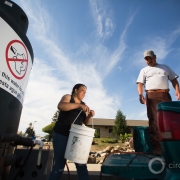The Stream, December 19: The Price of Reliable Water in Texas
The Texas state water plan, released every five years, recommends spending $53 billion on hundreds of water infrastructure projects to ensure an adequate supply through 2060. The state, the Associated Press reports, is relying on municipal governments to carry out much of the plan. But with local budgets pinched and costs rising (the 2007 plan estimated a price tag of $31 billion), where will the money come from? To cope with the drought, one Texas town got a loan from the state to build a 12-mile pipeline.
It’s not just in Texas that infrastructure costs are being assessed. The American Society of Civil Engineers argues in a new report that the U.S. should invest an additional $84 billion in water infrastructure by the end of the decade to cover a gap in capital spending. The money, ASCE says, should go toward treatment plants, pipe replacement, and stormwater management. Read the full report here.
Elsewhere in Texas, the Austin American-Statesman reports on the growing number of private water utilities in the state and the frequent rate increases they are requesting.
A regional administrator with the U.S. Environmental Protection Agency spoke with the Associated Press about the agency’s pending decision on pollution controls for an Arizona power plant that provides cheap water and power for the state’s residents. If the agency requires expensive technology, plant operators might decide to close the Navajo Generating Station.
Parts of Mexico are enduring their longest drought in 70 years, according to Agence France-Presse.
The Stream is a daily digest spotting global water trends. To get more water news, follow Circle of Blue on Twitter and sign up for our newsletter.
Brett writes about agriculture, energy, infrastructure, and the politics and economics of water in the United States. He also writes the Federal Water Tap, Circle of Blue’s weekly digest of U.S. government water news. He is the winner of two Society of Environmental Journalists reporting awards, one of the top honors in American environmental journalism: first place for explanatory reporting for a series on septic system pollution in the United States(2016) and third place for beat reporting in a small market (2014). He received the Sierra Club’s Distinguished Service Award in 2018. Brett lives in Seattle, where he hikes the mountains and bakes pies. Contact Brett Walton







Leave a Reply
Want to join the discussion?Feel free to contribute!